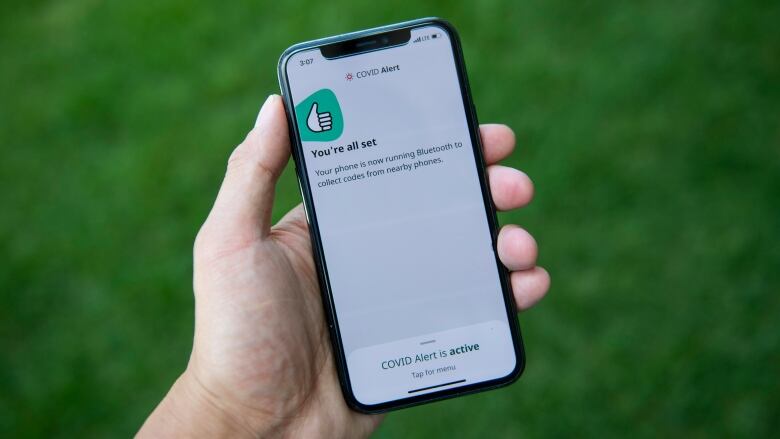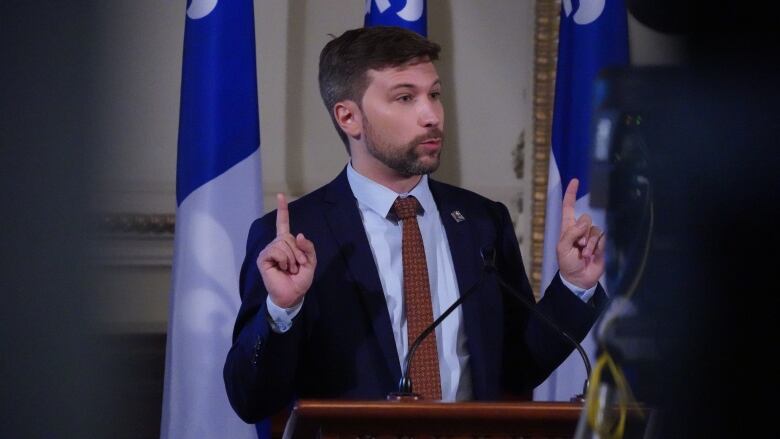Little enthusiasm among Quebec politicians as government mulls COVID-19 tracing app
Opposition parties skeptical about whether mobile phone technology can do much to limit spread of virus

The federal government's COVID-19 contact tracing app is among the most downloaded in the country, but as Quebec considers whether to build its own, opposition politicians are showing little interest in the project.
A legislative hearingbegan Thursday in Quebec Citydevoted to exploring the benefitsand downsides of mobile phone appsthat warnusers of potential exposure to the novel coronavirus.
Ahead of the hearing, the Quebec government revealed that around 17,000 Quebecershad taken part in online consultations since June.
Jolle Boutin, the Coalition AvenirQubec MNA who is chairing the hearing, said 75 per cent of the responses indicated support for a contact tracing app in Quebec.
"Now we want to hear from experts over the next few days to help us decide,"Boutinsaid, adding the government was open to both developing a Quebec version or signing on to Ottawa's.
COVID Alert, the federal government app, was downloaded more than 1 million times in the first week it was available, despite only working in Ontario. Albertaand the Atlantic provinces have said they will begin using COVID Alert as well.
Tepid response from opposition
But in Quebec, opposition parties feel little enthusiasm, or urgency, for either adopting the federal app or developing one in-house.
"The contact tracing app doesn't answer the real problems," said Marwah Rizqy, the Liberal critic for government administration.
"When we were short of workers in CHSLDs[long-term care homes], it was the army that responded. It wasn't a contact tracing app."

Rizqyadded that she wouldn't download a tracing app if it was available in Quebec."You're speaking to a woman who never downloaded the Waze [traffic] app," she told reporters in Quebec City.
QubecSolidaire'shouse leader, GabrielNadeau-Dubois, questioned the value of the apps, saying they haven't been effective elsewhere in the world and entail significant privacy risks.
"We haven't finalized our position yet, but I'm not going to hide the fact that we're looking carefully at what's happening outside of Quebec, especially in Canada, but also in other countries in the world."
Asked why Quebec wouldn't simply use the federal government's app, Nadeau-Dubois said: "last time I heard, health care was a competency of the Quebec government."
Fed app good on privacy, less so on accessibility
The federal government's app uses Bluetooth technology to exchange randomly generated codes with other phones in close proximity.
Those codes are stored in your phone for two weeks. If an app user tests positive for COVID-19, they input that information into their phone, which is then transmitted via the stored codes to other app users.
Any phone that was near the COVID-positive person for long enough receives an alert, informing the owner they may have been exposed to the virus.

Because the app usesBluetooth, rather than GPS, it has been lauded by privacy experts for protecting personal information.
In an opinion released last month, the federal privacy commissioner said"exceptionally strong measures have been adopted by the government to ensure that the identity of users is protected and not disclosed to the Government of Canada."
But the app only works on iPhones and Android phones built in the last five years. Advocacy groups worry this limits its accessibility to seniors and low-income Canadians, two population groups particularly vulnerable to the disease.
Martin Ouellet, theParti Qubcois's critic for digital strategy, said the app's accessibility was among his party's central concerns about a possible Quebec version.
"A lot of people talk about this technology as if it was easily accessible on a mobile phone, but a lot of Quebecers don't have a mobile phone," Ouellet said.
The hearings continue on Thursday.













_(720p).jpg)


 OFFICIAL HD MUSIC VIDEO.jpg)
.jpg)



























































































